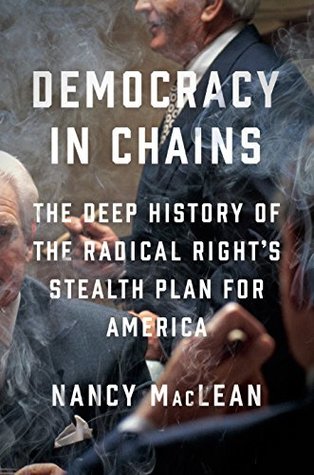More on this book
Community
Kindle Notes & Highlights
Read between
May 18 - June 19, 2019
seek in exchange for their contributions a voice in the content of the academic programs they fund and even in the overall direction of the university.
who have become an important resource for the Reagan administration,” another reporter noted, helping with its plans to spur economic recovery by cutting taxes, regulations, and domestic programs, and its promise to return authority to the states.
He was shocked: not one member of the president’s political team had studied the budget or had the slightest idea how it worked.
Or is he or she trying to diminish the reputation of the system with the public, so that when the right time comes to make changes to it, even small ones that in fact reduce benefits or change the rules for beneficiaries, those affected will be less likely to feel that something good is being taken away from them?
First, it would break down citizens’ lived connection to government, their habit of believing it offered them something of value in navigating their lives. Second, it would weaken the appeal of collective organization by inducing fracture among groups that had looked to government for solutions to their common problems.
Buchanan’s work had produced in economists’ thinking about government, making reliance on it “seem not nearly so credible as in the Fifties or Sixties.”
Armey was in some ways like Koch, in that he was very systematic in pursuit of his goals as the cause’s “legislative tactician,” in the words of one seasoned observer, not simply its chief ideologue. Armey studied the fine print of the House’s complex rules in order to determine with precision how best to move the items in the contract through the knotty legislative process.
Another team member boasted that his subcommittee was so tight, “we could kill motherhood tomorrow if it was necessary.”
To name just one index of how successful Manne had been: by 1990, more than two of every five sitting federal judges had participated in his program—a stunning 40 percent of the U.S. federal judiciary had been treated to a Koch-backed curriculum.
“Any modern democracy’s tax policy” was likewise trouble, because the voters’ “inevitable egalitarian instincts” would lead them, if unobstructed, to “redistribution.”21 To solve this problem, they had to bring about the end of the graduated income tax adopted after 1913 with passage of the Sixteenth Amendment, in favor of a single-rate flat tax.
from kindergarten through university, nurtured “community values, many of which are inimical to a free society.”
“Over half of congressional offices, from both sides of the political aisle, send staff to Buchanan Center events,” her fund-raising letter bragged.
And second, under the influence of one wealthy individual in particular, the movement was turning to an equally troubling form of coercion: achieving its ends essentially through trickery, through deceiving trusting people about its real intentions in order to take them to a place where, on their own, given complete information, they probably would not go.
libertarians have been seduced by Koch money into providing intellectual ammunition for an autocratic businessman.”
Koch had “no scruples concerning the manipulation of scholarship”; he wanted Cato’s output to aid his cause, period.
We may have democracy, or we may have wealth concentrated in the hands of a few, but we can’t have both.”
“rewriting of the social contract” under way, people will be “expected to fend for themselves much more than they do now.”
the nation’s school lunch program left poor children with “a full stomach—and an empty soul.”
The powers of these unelected managers to impose austerity measures would be vast, including the authority to unilaterally abrogate collective bargaining agreements, outsource services, sell off local resources to private companies, and change suppliers at
but because public choice showed that a government cure would be worse (from their perspective, of course) than the disease, global warming “is best left alone.”
the North Carolina General Assembly had violated the state constitution in sending children with tax subsidies to “private schools that have no legal obligation to teach them anything.” (His verdict was overruled by the state supreme court, which the Koch cadre had spent handsomely to control for just such eventualities.) The new for-profit virtual charter schools, whose CEO personally earned $4 million in 2014, were found, by one Stanford University research study, to have left their enrolled students falling far behind their public school counterparts, equivalent to missing “72 days of
...more
“the decline in unionization is strongly associated with the rise of income shares at the top.”
taking between a quarter and a third of workers’ contributions as fees. (One senator decried them as “thieves in jackets and ties” who
“the expansion of the voter franchise” beyond “wealthy male landowners” had produced the unfortunate result of enlarged public sectors. Alas, “the elimination of poll taxes and literacy tests leads to higher turnout and higher welfare spending.”
Knowledge of just how vulnerable humans are to hardwired drives that resist reasoned evidence, it seemed, might prove helpful in getting voters to unwittingly enable an “unpopular” agenda.65
in truth, the U.S. Constitution already restrains what we the people can do to a degree not seen in any other democratic nation.
Calling these inbuilt “majority constraining” obstacles “veto players,” the two scholars found a striking correlation: the nations with the fewest veto players have the least inequality, and those with the most veto players have the greatest inequality.
“Ominously, business has a good chance of opting out of the legal system altogether and misbehaving without reproach.” A subsequent headline noted that it amounts to a “Privatization of the Justice System.”
battery of new laws prevented it, such fraud would be used to


